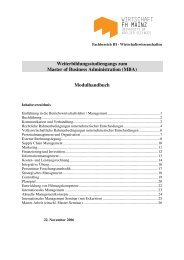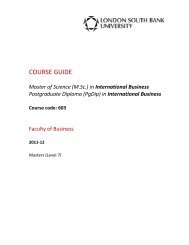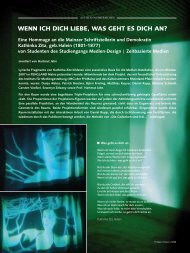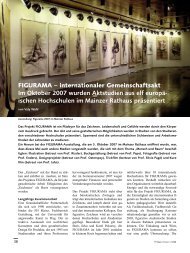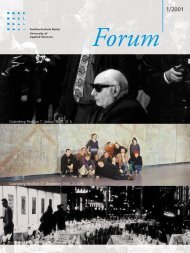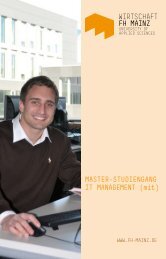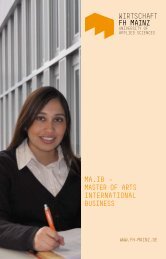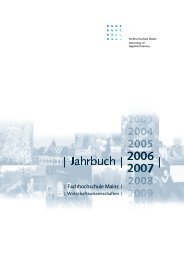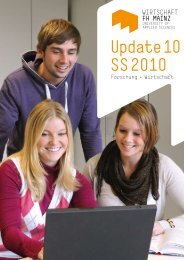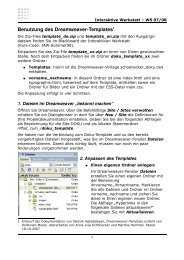Fachhochschule Mainz University of Applied Sciences
Fachhochschule Mainz University of Applied Sciences
Fachhochschule Mainz University of Applied Sciences
Sie wollen auch ein ePaper? Erhöhen Sie die Reichweite Ihrer Titel.
YUMPU macht aus Druck-PDFs automatisch weboptimierte ePaper, die Google liebt.
Business Studies faculty paper. But then, the<br />
Business School faculty <strong>of</strong> the <strong>University</strong> <strong>of</strong><br />
<strong>Applied</strong> <strong>Sciences</strong> in <strong>Mainz</strong> teaches many courses<br />
on advertising, marketing, psychology, creativity<br />
and <strong>of</strong> course foreign languages for students<br />
<strong>of</strong> business and commercial law. Therefore,<br />
maybe we should pay more attention to poetry<br />
and the way it can transport feelings and ideas<br />
in a powerful and efficient way.<br />
Back in Brussels, we had a six hour wait, which<br />
was plenty <strong>of</strong> time to think about all the events<br />
<strong>of</strong> the past week. My colleagues and the other<br />
conference participants from London, Germany<br />
and India will probably understand many <strong>of</strong><br />
the references made in the poem, but for those<br />
<strong>of</strong> you who were not there, or have never<br />
(yet!) had the chance to visit India, let me<br />
explain…<br />
“Three and a half hours ahead, or fifty years<br />
behind?”<br />
International jet-setters are used to adjusting<br />
their watches as they fly from one time zone to<br />
another, but I have never before experienced<br />
a something and a half hour difference! After<br />
much discussion and examination <strong>of</strong> flight<br />
schedules etc. we finally<br />
agreed, yes, Madras is<br />
definitely three and a half<br />
hours ahead <strong>of</strong> Frankfurt.<br />
But why fifty years<br />
behind? Many <strong>of</strong> the<br />
buildings, banks and<br />
<strong>of</strong>fices which we visited<br />
reminded me <strong>of</strong> England<br />
or America in the 1950s,<br />
(apart from the computer<br />
screens on the desks).<br />
Old buildings, with wooden<br />
panelling. Small electric<br />
heaters or fans, large<br />
<strong>of</strong>fice spaces divided by<br />
metal grids.<br />
By the way, my memories <strong>of</strong> the fifties are not<br />
really personal ones, but based on films and<br />
TV programmes!<br />
“Standing still, moving forward, never in a<br />
line”<br />
This is my impression <strong>of</strong> the discrepancies such<br />
as mentioned above – old-fashioned organisations<br />
and design alongside modern technology.<br />
For example, women and children building<br />
ditches by the road, more or less by hand, so<br />
that internet cables can be installed. It also<br />
refers to moving through the streets, either by<br />
foot, car or rickshaw. Crossing roads requires<br />
new strategies, pedestrians must group together<br />
and flow between the rickshaws, bicycles,<br />
cars and oxen! The only traffic rule seems to<br />
be that there are no traffic rules, the street is<br />
dominated by the sound <strong>of</strong> cars and electronic<br />
rickshaws horning and one day I saw a blind<br />
man walking calmly along the road as if it were<br />
Jahrbuch Wirtschaftswissenschaften | FH <strong>Mainz</strong> | 2002<br />
the safest place on earth! India – a land <strong>of</strong><br />
incomprehensible contrasts!<br />
“How much will it cost to get there? How<br />
long will it take? We’ll wait until you’re finished,<br />
right here at the gate”<br />
This refers to the whole system <strong>of</strong> rickshaw<br />
transport. First you must find out what the<br />
‘going rate’ is in order to barter your price.<br />
But there is so much information which is<br />
unavailable to tourists, like one-way systems,<br />
road-works, rush hour times, religious holidays<br />
and processions which need to be taken into<br />
account to make a realistic calculation. I found<br />
that when I <strong>of</strong>ten thought the rickshaw drivers<br />
were making things up in order to trick us, it<br />
usually turned out to be true.<br />
“Waiting for the western man, One foot in<br />
the East”<br />
Once agreement is reached, your rickshaw<br />
driver will then try to adopt you for the rest<br />
<strong>of</strong> your trip. They take a personal interest in<br />
your lives, and will even greet you days later.<br />
They will usually wait for you for the return<br />
trip, too.<br />
“Time is on the left<br />
hand, with the other<br />
one we eat”<br />
For many westerners, it<br />
is not just the spicy food<br />
which requires getting<br />
used to, but also learning<br />
to eat without cutlery,<br />
and only touching the<br />
food with your right hand.<br />
(This is especially difficult<br />
for lefties!). If you want<br />
to eat where Indians eat,<br />
(which is to be highly<br />
recommended) you also<br />
have to learn to drink<br />
without touching the rim<br />
<strong>of</strong> the cup. Obviously, for<br />
hygienic reasons, the right hand is saved for<br />
food, the left hand being for other ‘dirtier’<br />
tasks. This made me think about the fact that<br />
we wear our time-keepers, our watches on<br />
our left hand. This makes our western time<br />
obsessions seem much less praise-worthy. Our<br />
punctuality phobias are placed on the ‘dirty<br />
and unpleasant’ hand.<br />
“For our humble contributions and your<br />
distinguished presence”<br />
illustrates the fascination Indian English had<br />
for me as a language teacher. India has a<br />
population <strong>of</strong> one billion people – one in six<br />
earthlings live in India. In India English is<br />
a first, second and foreign language for its<br />
inhabitants. All <strong>of</strong> them who have gone through<br />
some formal education and most <strong>of</strong> the citydwellers<br />
all speak English at least as a second<br />
language, although British or American Eng-<br />
| Auslandsbeziehungen | 31<br />
lish speakers may sometimes have great difficulty<br />
understanding their pronunciation. English<br />
is the common language across the subcontinent,<br />
even though India has over twenty<br />
<strong>of</strong>ficial languages. India has solved the crosscultural<br />
language problem a lot more efficiently<br />
than the European Union, without losing its<br />
regional languages or identities. However, the<br />
English spoken varies not only in intonation<br />
and melody from British English, it is the<br />
expressions and phrases used which kept me<br />
constantly fascinated. The word ‘humble’, for<br />
example was constantly being used to praise<br />
and flatter people. And everyone at the conference<br />
was ‘distinguished’! But soon I did feel<br />
‘humble’, especially when experiencing the<br />
amazing hospitality and kindness <strong>of</strong> our Indian<br />
hosts at Loyola college, and by the generosity<br />
and friendliness <strong>of</strong> everyone we met. Wouldn’t<br />
it be nice if more Westerners treated foreigners<br />
with the same kind <strong>of</strong> openness and respect???<br />
“Slow, fast, tranquil, fleeting – what time is<br />
the six o’clock meeting?”<br />
The Indian speakers at the meeting <strong>of</strong>ten made<br />
reference to the notorious unpunctuality <strong>of</strong><br />
Indians. The phrase ‘what time is the six o’clock<br />
meeting’ was used as an amusing example <strong>of</strong><br />
this by one <strong>of</strong> the speakers at the conference.<br />
However, my experience <strong>of</strong> Indian time-keeping<br />
was that the Indians were no less ‘unpunctual’<br />
(despite their constant references to this) than<br />
Germans are ‘punctual’ in real life!<br />
Finally, I must thank Mr. Lawrence Surendra,<br />
a UN consultant, for his wonderful conference<br />
contribution, which included his story about<br />
“You have the clocks, we have the time”.<br />
The story referred to a Nepalese man who<br />
landed in Geneva for a conference on his first<br />
trip to Europe and saw nothing but shops<br />
selling clocks and watches, and people and<br />
traffic rushing about as he emerged from the<br />
train station. We were very pleased to show<br />
Mr. Surendra around <strong>Mainz</strong> on a return visit<br />
he made here in June 2002 to evaluate the<br />
programme.<br />
So, I hope you enjoyed learning about my<br />
‘Indian Time’ and that it will inspire you to<br />
include some time for India in your lives.<br />
Thank you, Pr<strong>of</strong>. Scharnbacher and the FH<br />
<strong>Mainz</strong>, Pr<strong>of</strong>. Jayaraj and Loyola College, Chennai,<br />
Beate Wengler and the South Bank <strong>University</strong><br />
and the European Commission for organising<br />
the conference and enabling me to participate<br />
in it. In order to make this experience<br />
worthwhile for all concerned, I shall try to<br />
encourage future student exchanges between<br />
Europe and India. Indian development depends<br />
on close contact with the west, but I suspect<br />
Europeans can benefit from Indian experience<br />
even more! Δ




